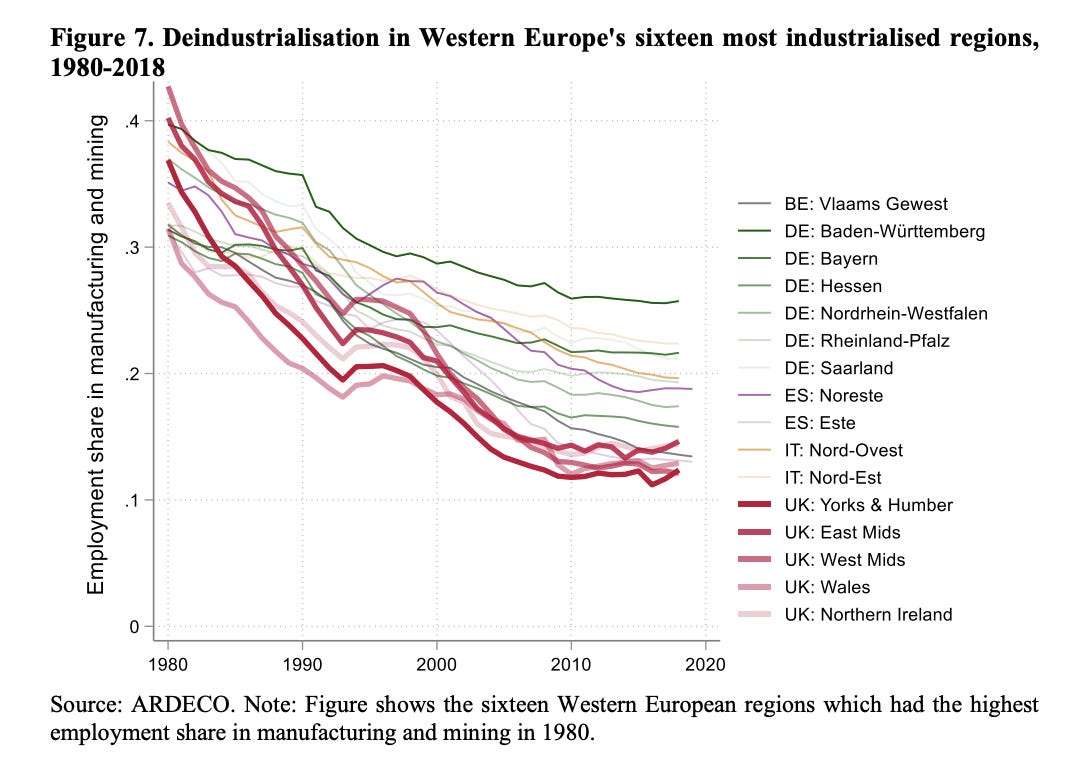Why Can’t Everyone Earn Enough To Live?
And why is there so much anger around
“We’re working as hard as we can, but we just can’t make ends meet.” I’ve heard this phrase so many times. But it’s not just what people say, it’s how they say it. The drop of the eyes, the resigned tone, the deep sighs.
Sometimes it’s unpleasant. The door slammed in my face. Anger. Fury. “F*** off”.
I don’t blame them. Because the truth is, no matter how hard people work, not everyone can earn enough to live a decent life. In the UK, a third of us cannot afford the essentials. That is why we’re seeing more anger, more despair. Work simply doesn’t pay enough, and (housing) costs are too high.
This isn’t something new - it began decades before the current cost-of-living crisis and is happening across high-income nations, fuelling the rise of populism.
This problem is ripping us apart. It’s the problem I came into politics to solve.
Graph 1: Income for a 2-earner family and Basic Needs (aka MIS)
Source: https://www.jrf.org.uk/a-minimum-income-standard-for-the-united-kingdom-in-2024
This same story is playing out across high-income nations. Even when economies grow, people are not sharing in that growth. Working hard simply doesn’t work.
It hasn’t always been this way. The thirty years after the Second World War were known as, Les Trente Gloreieuses, where everyone shared in economic growth. So, what changed?
Technology, that’s what.
Starting in the 1980’s, and across high-income nations, technological change destroyed mid-pay manufacturing jobs. Manufacturing job tasks, which consisted of repetitive physical motions, could be performed by newly invented machines instead of non-graduate men. This led to a rapid decline in the manufacturing sector and industrial areas went into economic decline. These former industrial areas have names you’ve already heard of “The Rust Belt”, “The Red Wall”. Same factor, different countries.
Graph 2: Deindustrialisation across Western Europe
Source: https://www.hks.harvard.edu/sites/default/files/centers/mrcbg/files/198_AWP_final.pdf
Technological change destroyed mid-pay manufacturing jobs and left in its wake a divided labour market with high-pay graduate jobs and low-pay non-graduate ones. High-pay graduate jobs where those that benefited from technological change (think about how graduates use excel and powerpoint) while low-pay jobs where relatively unaffected by technological change (bartenders and hairdressers have done the same fundamental job for decades).
This decline in mid-pay manufacturing jobs led to a large increase in earnings inequality. High-pay earners left everyone behind. These high-pay graduate jobs are concentrated in major cities rather than disbursed across the country like the manufacturing jobs of old (we’ll come back to this).
Graph 3: Change in low-, mid-, and high-pay jobs across European countries
Source: https://pubs.aeaweb.org/doi/pdfplus/10.1257/jep.29.3.3
Non-graduate jobs, in general, do not pay enough to live on. The average salary for a young non-graduate is £26,000. A single person with no dependents needs at least £28,000 a year to afford the basics. Children are, parents reliably inform me, even more expensive.
The last (New) Labour government found a way around this problem: redistributing the proceeds of growth to low-pay earners through tax credits. It worked, but the incoming Conservative government then delivered no growth.
Non-graduate men, in particular, have found the postindustrial economy hard. Unlike their fathers, non-graduate men today are finding it harder to get any work as manufacturing jobs have disappeared. These young men who can’t find (good) jobs are the fuel for populist movements.
Graph 4: Employment Rates by Gender and Graduate Status
Source: https://theconversation.com/men-without-university-degrees-have-suffered-the-biggest-hit-to-employment-since-covid-170042
If non-graduates aren’t getting good jobs, you might think that graduates are doing well.
Think again.
Graduates have higher paying jobs but these jobs are in major cities where we have not been building enough homes (I told you we’d come back to this). Not building enough homes has led to higher and higher housing costs. The UK, as the most economically centralised country in the OECD, is possibly the worst-affected. Around 75% of high-paying jobs are now found in London. Graduates working in London are paying more than half their income on rent.
Graph 5: Change in House Price to Income Ratio in the UK
Working hard doesn’t work anymore. Working hard does not guarantee earning enough to pay your bills. Working hard can’t change the fact (housing) costs are rising much faster than wages.
Politics is angrier than we’ve ever known it. It’s because people have been working harder and falling further behind. When working hard isn’t enough to provide for your family, wouldn’t you be angry? Scratch that. If you can’t even afford to have a family, wouldn’t you be a bit hacked off? Would you, perhaps, turn to a political party that promised to tear it all down?
Making life affordable is the key challenge we face. It’s what I came into government to help solve. I will return to how we do this in future articles.







Aren’t tax credits, funded by government, a signal to employers to drive down wages?